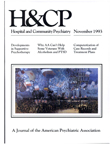Comorbid Substance Abuse and Recovery From Acute Psychiatric Relapse
Abstract
The study investigated whether chronic mentally ill patients whose psychiatric relapse was complicated by active substance abuse recovered from relapse at a different rate than similar patients with no comorbid substance abuse. Methods: A total of 401 patients involuntarily hospitalized on a short-term psychiatric treatment unit received a urine toxicology screen on admission; the severity of their psychiatric symptoms was rated on the fifth day of hospitalization using the Brief Psychiatric Rating Scale (BPRS). Differences in scores between patients who bad positive screens and those who had negative screens were evaluated for various diagnostic groups. Results: Patients who had a positive screen and a primary discharge diagnosis of psychoactive substance abuse had a BPRS total score indicating less psychopathology than similarly diagnosed patients with negative screens. Patients who had positive screens and a diagnosis of personality disorder had some BPRS subscale scores indicating greater psychopathology than their counterparts with negative screens. No other significant differences in recovery rates between the two groups were found, although comparisons indicated trends toward faster recovery in some areas of functioning by schizophrenic patients with positive screens and affective disorder patients with negative screens. Conclusions: Results suggest that use of a urine toxicology screen and the BPRS early in treatment may aid in assessing the acute course of several psychiatric disorders and the effect of comorbidity.
Access content
To read the fulltext, please use one of the options below to sign in or purchase access.- Personal login
- Institutional Login
- Sign in via OpenAthens
- Register for access
-
Please login/register if you wish to pair your device and check access availability.
Not a subscriber?
PsychiatryOnline subscription options offer access to the DSM-5 library, books, journals, CME, and patient resources. This all-in-one virtual library provides psychiatrists and mental health professionals with key resources for diagnosis, treatment, research, and professional development.
Need more help? PsychiatryOnline Customer Service may be reached by emailing [email protected] or by calling 800-368-5777 (in the U.S.) or 703-907-7322 (outside the U.S.).



